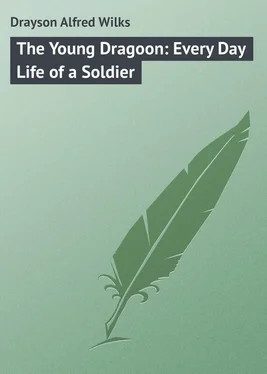Alfred Drayson - The Young Dragoon - Every Day Life of a Soldier
Здесь есть возможность читать онлайн «Alfred Drayson - The Young Dragoon - Every Day Life of a Soldier» — ознакомительный отрывок электронной книги совершенно бесплатно, а после прочтения отрывка купить полную версию. В некоторых случаях можно слушать аудио, скачать через торрент в формате fb2 и присутствует краткое содержание. Жанр: foreign_prose, foreign_children, на английском языке. Описание произведения, (предисловие) а так же отзывы посетителей доступны на портале библиотеки ЛибКат.
- Название:The Young Dragoon: Every Day Life of a Soldier
- Автор:
- Жанр:
- Год:неизвестен
- ISBN:нет данных
- Рейтинг книги:4 / 5. Голосов: 1
-
Избранное:Добавить в избранное
- Отзывы:
-
Ваша оценка:
- 80
- 1
- 2
- 3
- 4
- 5
The Young Dragoon: Every Day Life of a Soldier: краткое содержание, описание и аннотация
Предлагаем к чтению аннотацию, описание, краткое содержание или предисловие (зависит от того, что написал сам автор книги «The Young Dragoon: Every Day Life of a Soldier»). Если вы не нашли необходимую информацию о книге — напишите в комментариях, мы постараемся отыскать её.
The Young Dragoon: Every Day Life of a Soldier — читать онлайн ознакомительный отрывок
Ниже представлен текст книги, разбитый по страницам. Система сохранения места последней прочитанной страницы, позволяет с удобством читать онлайн бесплатно книгу «The Young Dragoon: Every Day Life of a Soldier», без необходимости каждый раз заново искать на чём Вы остановились. Поставьте закладку, и сможете в любой момент перейти на страницу, на которой закончили чтение.
Интервал:
Закладка:
Drayson Alfred W. Alfred Wilks
The Young Dragoon: Every Day Life of a Soldier
Chapter One
Dear lovely bowers of innocence and ease,
Seats of my youth, when every sport could please;
How often have I loiter’d o’er thy green,
Where humble happiness endeared each scene!
I am a soldier, Frederick Trenchard, at your service. The prospect before me in my early days was, that instead of following the drum I should have followed the plough. My father was a farmer, living in the Midland counties; and I am the only one of a numerous family and a wide circle of family friends who ever took the Queen’s Shilling, and turned the ploughshare into a sword. My grandfather was a farmer; my uncle was a farmer; my cousin who married the heiress was a gentleman farmer; my cousin who fell in love with beer and skittles was a farm labourer. We were all of us sons of the soil, and it was the popular opinion in our family, that even sailors were no better than they should be (and, Heaven help us all, I suppose we none of us are), but that soldiers were utter outcasts – Sawney Beans in her Majesty’s livery – vultures in red coats and pipeclay – at which even Job Chequers, of the Green Man, shook his head, objecting strongly to the billet, and assuring everybody whom it concerned, or did not, that he would sooner pay the billet twice than lodge a soldier once.
There was a tradition in the village of a certain young Meadows who had gone for a soldier; what became of him I never heard, but always was taught to imagine the worst; as whenever it happened that any youngster had been engaged in a frolic, the wiseacres shook their heads, and said – “Ah! they saw how it would be – just like Meadows.” Now, I would not for a moment lead any of my readers to suppose that a soldiering life is the best a man can lead. Very far from that is the case. When I enlisted it was said of me, that I had given up a good home, sacrificed the esteem of every member of my family for the life of a vagabond. This was very far from being the case either. To be sure I gave up a good home, exchanging it for a life in barracks to begin with, and a life of peril to go on with; but I was not a vagabond, neither was there anything in what I had done to forfeit the esteem of good people. All sorts are wanted in this world. When we have all learned to be peaceable; when there is no foe to withstand, no skulking enemy to overcome, then I suppose Cincinnatus will return to his cabbages; till then the soldier is a necessity, and by his good sword and his strong arm the wealth of our country is preserved from the hand of the spoiler, and our honour maintained in the face of the world.
I am thinking of that dear old home of mine; the quiet village street, the little church, the littler clerk (forgive the grammar) who said Amen on Sundays – I am thinking of the squire’s house, encircled by a brotherhood of ancient elms, of the green pastures that led down to the river, of the yellow uplands that made the farmer’s heart rejoice – I am thinking of our own quiet homestead. A middling-sized farm was ours, but it had been ours for many a long year, and it was not burdened by mortgage; we were able to pay our way, and if father, when he rode his old cob “Billy” to market on Mondays, and dined with other farmers at the “Stag’s Head,” grumbled, do not all farmers grumble? and I expect they have done so ever since the first sickle was thrust into ripened corn.
Well, I was to be a farmer. I was getting into farming habits. I was speculating what I should do when my turn came to ride to market. To market, however, I never rode – my style of riding was learned in another school, and it would rather have startled the steady paced villagers of – to have seen me, as once on an October day I rode – dashing forward wildly with a whole body of brave-hearted fellows – right in the face of destruction, but steadily forward in the name of duty – even though duty meant death.
And now, apologising for this introductory chapter, let me briefly tell you why I became a soldier.
Chapter Two
Angels and ministers of grace defend us! —
Be thou a spirit of health or goblin damn’d,
Bring with thee airs from heaven or blasts from hell,
Be thy intents wicked or charitable,
Thou comest in such a questionable shape!
Situate about a quarter of a mile from the village near which my father resided, was the parish church, a venerable structure clad with ivy. Near by a large yew-tree spread its branches over the centre of the churchyard. About one hundred yards from the church stood the cottage of Nicholas Hartley (more generally known by the name of “Old Nick”), the sexton and bell-ringer. He also carried on the business of a cobbler. “Old Nick” was by no means so sober a man as he ought to have been, considering the serious nature of his calling. He was quite as often to be found at the Green Man as at his own cottage. There were several youths in the village, including myself, who were prone to practical joking, and one unfortunate night we concocted a scheme to set the whole of the people in the village in wonder and fright.
It was a dark and stormy night in December, more than twenty years ago, when our plans were matured and successfully accomplished. Eight of us met, by a preconcerted arrangement, in the old churchyard, a little before midnight. One of the actors in the drama was the son of the blacksmith, who had found a key to open the door of the belfry. With this we gained admission. Thence unbolting a door, we were enabled to reach the roof of the chancel; this was composed of lead, and was quite flat, with a high stone coping all round it. Having gone so far we descended to the churchyard, and tied fast together the legs of the chimney-sweeper’s donkey, that pastured among the grave-stones. Sheltered under the yew-tree, and binding him so as to prevent his struggling, we attached a stout waggon-rope, procured from my father’s barn, to Neddy’s body. Leaving one to guide his ascent with a guy rope, the rest of us hauled him up to the roof of the chancel. We then untied the rope that bound his legs, and enveloped him in a snow-white sheet, tying his long ears down to his neck with a piece of twine, and so adapting the sheet to his body as to prevent its getting disarranged by the very high wind.
Thus was his “mokeship” left standing in the middle of the roof, apparently as contented as where we found him under the yew-tree. After this we fastened one end of the rope to the “pull” of the only bell in use, and passing the other through the grated hole in the wall of the belfry, carried it over the roof of the chancel and dropped it to the ground. The two doors were now made secure as we had found them, and one of us mounting with the rope to the very top branch of the yew-tree, we there made it fast; after this final step it was considered the best policy to move away as fast as we possibly could.
Being placed on rather high ground, the wind swayed the old yew-tree to and fro without hindrance, the consequence being that the solitary bell tolled forth its notes with strange, supernatural, and most irregular tones, all the more astonishing from their occurring at that time of night. The inhabitants were soon aroused, as we could distinctly see from our hiding-place, by the number of lights in the windows, and the lanthorns flitting about the main street – no gas or oil-lamps existing in our village. At length, a strong muster of farm-labourers, with “Old Nick” and the parish constable at their head, repaired to the church, the principal instigators of the mischief bringing up the rear. Knowing, as I did, that there was nothing to be alarmed at, I volunteered to accompany the sexton and policeman into the belfry. This was a job neither of them relished when they found the door securely locked, for they had at first an idea that some drunken men had broken the lock and were amusing themselves at the expense of the whole village. Just at the moment we reached the door of the belfry, a piercing shriek was heard from a female in the midst of the crowd below – an arm was stretched out, with the finger pointed in the direction of the donkey, enshrouded in the snow-white habiliments as we had left him. Sir Moke played his part excellently well; one of his ears had escaped from under the twine, and moved to and fro in such a manner as quickly to be designated “one
Читать дальшеИнтервал:
Закладка:
Похожие книги на «The Young Dragoon: Every Day Life of a Soldier»
Представляем Вашему вниманию похожие книги на «The Young Dragoon: Every Day Life of a Soldier» списком для выбора. Мы отобрали схожую по названию и смыслу литературу в надежде предоставить читателям больше вариантов отыскать новые, интересные, ещё непрочитанные произведения.
Обсуждение, отзывы о книге «The Young Dragoon: Every Day Life of a Soldier» и просто собственные мнения читателей. Оставьте ваши комментарии, напишите, что Вы думаете о произведении, его смысле или главных героях. Укажите что конкретно понравилось, а что нет, и почему Вы так считаете.












